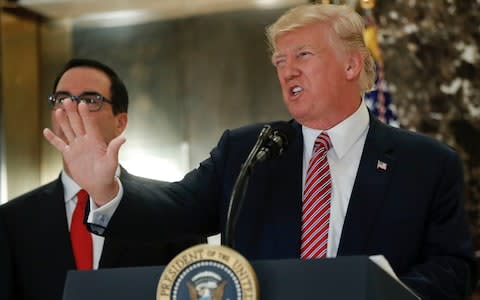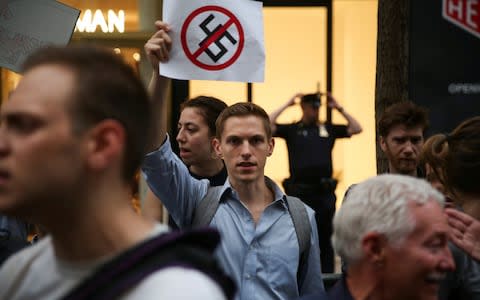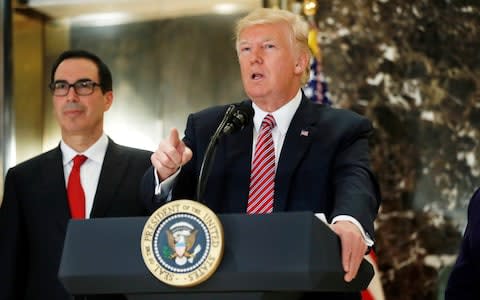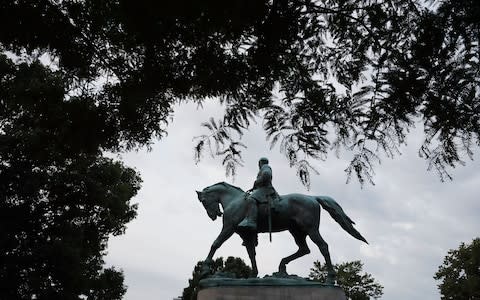Donald Trump says both sides to blame for Charlottesville violence and the 'alt-left' bears some responsibility

Donald Trump has doubled-down on his response to the violent white supremacist rally in Charlottesville, claiming in a combative address on Tuesday that both sides were "very violent".
The US president was widely condemned by Democrats and Republicans for his comments, but received praise from far-right figures such as former KKK leader David Duke.
Mr Trump said there were some "very fine" people on both sides of the protests over the weekend, in which neo-Nazis clashed with anti-racism demonstrators leaving one woman dead and several injured.
Mr Trump claimed the "alt-left" bears some responsibility for the violence and refused to condemn the "alt-right" activists.

“You had a group on one side that was bad and you had a group on the other side that was also very violent," he said. "No one wants to say that, but I’ll say it right now: You had a group on the other side that came charging in without a permit and they were very, very violent.”
"They came at each other with clubs ... it was a horrible thing to watch," Mr Trump said.
Hundreds of white nationalists converged in Virginia over the weekend to protest plans to remove a statue of General Robert E Lee, commander of the pro-slavery Confederate army in the US civil war.

They were met by crowds of anti-racism demonstrators as tensions escalated to violent clashes. A suspected Nazi sympathiser, James Fields, plowed his car into a group of the counter-protesters, killing a young woman and injuring 19 other people.
The president on Tuesday described Fields as a "disgrace to himself, his family and this country".
Mr Trump had been criticised on both sides of the political spectrum for his initial comments on Saturday in which he blamed "many sides" for the violence, but on Monday he explicitly condemned right-wing racist elements.

That position apparently changed again on Tuesday.
He defended himself against the charge he had failed to condemn Nazi and white supremacist groups saying that "there are two sides to a story" and that some of the facts about the violence are not yet clear.
Referring to the campaign against Confederate-era monuments to civil war leaders such as Lee, Mr Trump asked whether statues of George Washington and Thomas Jefferson were the next to be targeted.
“Many of those people were there to protest the taking down of the statue of Robert E. Lee,” he said.
“This week, it is Robert E. Lee and this week, Stonewall Jackson. Is it George Washington next week and is it Thomas Jefferson the week after? You have to ask yourself, where does it stop?”
The president sympathised with the protesters who opposed removing the Lee statue in Charlottesville, but offered no equivalent remarks for those campaigning for its removal.
"You had people in that group ... that were there to protest the taking down of a very, very important statue and the renaming of a park from Robert E. Lee to another name," he said.

The president's remarks were welcomed by David Duke, the former grand wizard of the Ku Klux Klan and a prominent white nationalist, who tweeted after the press conference: "Thank you President Trump for your honesty & courage to tell the truth about #Charlottesville & condemn the leftist terrorists."
However, he was widely condemned by figures on both sides of the political spectrum.
House Speaker Paul Ryan said: "We must be clear. White supremacy is repulsive. This bigotry is counter to all this country stands for. There can be no moral ambiguity."
Ileana Ros-Lehtinen, a Republican congresswoman from Florida, said: “Blaming ‘both sides’ for #Charlottesville?! No. Back to relativism when dealing with KKK, Nazi sympathizers, white supremacists? Just no.”
.@realDonaldTrump: This was not "both sides" pic.twitter.com/NC05csEFd9
— Terry McAuliffe (@TerryMcAuliffe) August 15, 2017
Virginia Governor Terry McAuliffe, in whose state the violence occurred, said "this was not both sides".
"Our Commonwealth and nation are still reeling from one of the largest outpourings of hatred and violence we have experienced in recent history. We need real leadership, starting with our President."
Mark Warner, a Democratic senator from Virginia, tweeted: “No words."
Mr Trump claimed that race relations had improved since he took office in January.
Charlottesville far-right protest
When asked why he waited until Monday to explicitly condemn hate groups present in Charlottesville, Mr Trump said he wanted to be careful not to make a "quick statement" without all the facts.
"If the press were not fake and if it was honest, the press would have said what I said was very nice," the president added.
He also refused to back his controversial and apparently under pressure chief strategist, Steve Bannon.
"We'll see what happens with Mr Bannon," he said, adding: "I like Mr Bannon. He's a friend of mine... He is a good man. He is not a racist."
Mr Bannon is seen as the figurehead of the "alt-right", a loosely defined group with far-right beliefs.
Mr Trump’s business advisory council was hit on Tuesday by its fifth resignation in three days over his handling of the Charlottesville riots. Only eight people now remain on the board.
After the press conference Richard Trumka, president of the largest federation of labour unions in the US, the AFL-CIO said in a statement: "We cannot sit on a council for a president who tolerates bigotry and domestic terrorism."
As Mr Trump ended his extraordinary press address last night, a question was shouted at him as to whether he planned to visit Charlottesville. He responded by saying that he owned property there - one of the largest wineries in the United States.
